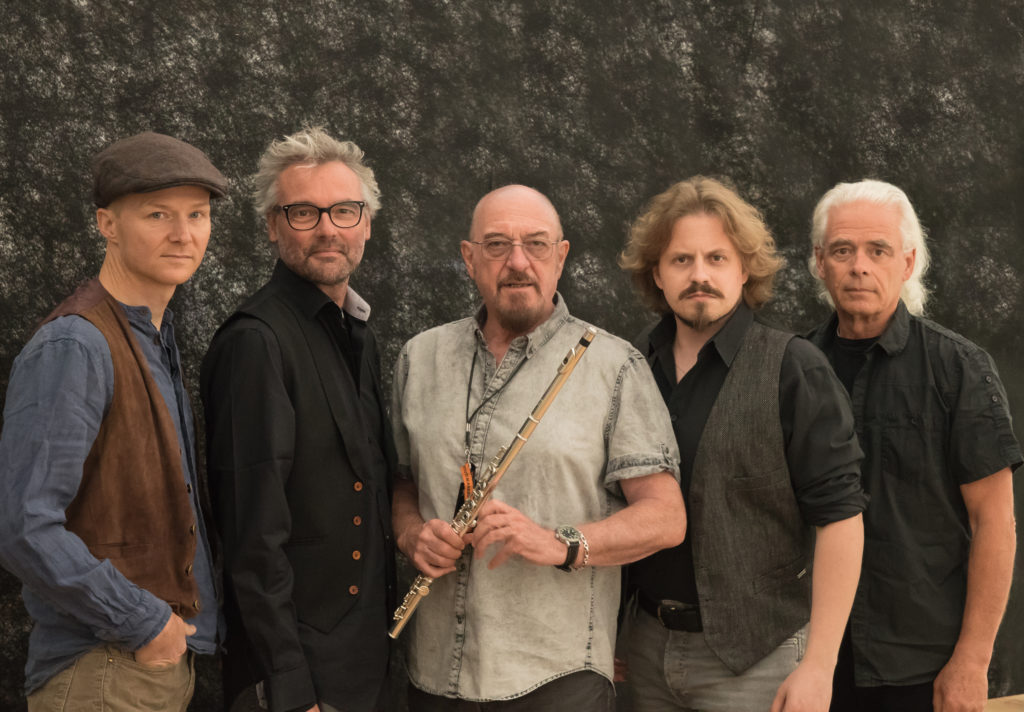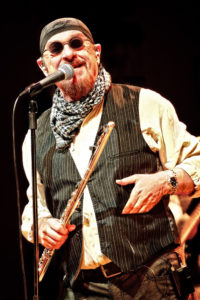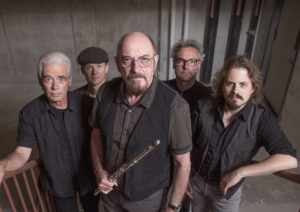
Music Life Magazine spoke to Jethro Tull founder, frontman and primary songwriter Ian Anderson last summer and at that time, he seemed somewhat blasé about the whole notion of celebrating the band’s 50th anniversary in 2018. At the time, he didn’t feel it necessary to make that big of a deal of it, claiming he was not really one to look backward, but preferred to live for today.
But once anniversary hit and offers to do tours related to the half-century commemoration came flooding in, alongside increased fan interest and support, Anderson jumped onto the bandwagon.
At the writing of this article, Jethro Tull has completed a short run through Scandinavia, and will tour the U.K. throughout much of April, with a couple of dates in Russia happening at the end of the month. A tour through parts of the United States begins May 30 and lasts until June 9, when the band jets back across the pond for two shows in the Czech Republic before coming back to North America from June 29 to July 7, including shows at the Budweiser Stage in Toronto on July 3, at the Ottawa Bluesfest on July 6 and the Montreal Jazz Festival the following day.
“Particularly last year, I wasn’t really looking at doing anything other than a passing reference, a nod and a wink to the 50th anniversary. But it began to present the kind of challenges and the detail of some repertoire which we hadn’t played for a long time, and the way of presenting it, to make it a bit more fun. And also, I realized it was to not just to play the music but to pay homage to the 37 other musicians that have made up Jethro Tull over the years,” Anderson said before heading out for the first tour dates.
“And the more I got into thinking about it and working on it, the more enthusiastic I became, but armed with the knowledge that I only have to do this for 10 months. So, for the next 10 months it has my full commitment, starting when I fly off and do the first shows in Denmark and Norway and Finland and Estonia. We’re just about to start up on a series of tours that takes us through until the end of the year.”
Anderson also said that rather than spread the setlist out over the entirety of the band’s recording career, which spans 21 studio albums, starting with This Was in 1968 and going until the last album under the Jethro Tull moniker, which was a Christmas release in 2003, he was focusing on the albums of the band’s first decade or so. During that time period, the band released an album a year from 1968 through to 1980, including what are seen as seminal Jethro Tull masterworks such as Aqualung, Thick as a Brick, Too Old to Rock ‘n Roll, You Young to Die, Songs from the Wood and Heavy Horses.

“I should guess that 80 per cent of the material in the show is from the first 10 years of Jethro Tull. That’s the period when Jethro Tull became known to most people in most countries. During the 1970s and just into the 1980s we reached countries like India and the former Soviet Bloc countries and Latin America. It was an age when rock music was part of the process, in a way, of deactivating the tensions that existed between some fascist countries and communist countries and the western world,” Anderson explained.
“And we along with many other bands of that ilk were kind of a defusing mechanism to let things come to pass in a slightly more genteel way than would have been the case had the public, particularly young people, been aggressive and violent in demanding their rights. So, when [then Soviet leader] Mikhail Gorbachev relaxed the rules and allowed western music to be released for the first time on the Russian state record label Melodiya Records, he chose Jethro Tull and The Beatles. Although I know that he didn’t make the choice himself, he just endorsed it. And I know this because I’ve actually spoken to him about it. He certainly was the one to set into motion the relaxing of the rules through Glasnost and Perestroika and the whole general shifting that was allowing in rock music, which was already underground in Russia or the Soviet countries, since the 1970s. But it was the official recognition that was the seal of gentle approval. And I think these are important parts of contemporary history the way western arts and entertainment – culture if you will – played its part in gradually loosening tensions elsewhere in the world.”
Anderson believes that the period of the mid-1960s through the mid-1970s is unmatched in terms of the effect that music and popular culture had on changing society and politics throughout the world and that it is highly unlikely, even in the politically charged atmosphere of 2018, that music can play that same mitigating and progressive role that it did back then.
“I think that the movies, the literature and the music of that time was the big game changer. And in this age where mass media crosses all boundaries, I don’t think we have that need for that kind of change. It’s automatically recognized when an American rap artist releases a new album that it will be getting played in Spain and Russia and wherever as soon as anybody has heard it. There is no searching, no quest any more. There is no need to look for things, or seek out new ideas, because it’s all delivered to you,” he said.
“Things are so immediate, so I don’t think we have that need for music to be so much the catalyst for change; the change has already occurred by now.”
For a band to last 50 years in the public consciousness, let alone still tour consistently throughout the globe year after year, means the songs that band created have entered into the cultural lexicon of at least two and probably three generations. This in turn means that the music itself must still have a relevance, a depth of meaning and an emotional ‘tug’ that sticks in the hearts, minds and spirits of those who listen to it.
“Well, it’s the same for the music of the Moody Blues, or Deep Purple, or Yes, or the Beatles, the Rolling Stones, Led Zeppelin – I mean it’s all remained in place, and many of the bands who are also enjoying their 50th anniversary right now, for instance Yes, it’s music that people of a generation grew up with. So, it plays a part in their personal histories. And for their children or even their grandchildren there may be an interest in how all that came to be – how the music of their generation came to be,” Anderson said.
“Therefore, many young people are going back and looking at the history of music, just like I did when I was a teenager and looking back at the history of black American blues and discovering music that was made in the 1930s. Curious minded people, regardless of their age, will try to seek out the origins that determine the way in which something developed. If they have a genuine interest in music, they will probably go back and take a look and they will most likely stumble across Jethro Tull and the bands I mentioned previously.
“Heavy metal, progressive rock, blues, it’s still the currency of today’s music – contemporary folk music too. Whether you are a singer/songwriter or a hard rock band, whatever it is you might be doing, you are probably dealing in a genre that you can trace back many decades. I think in some cases there’s not a busting amount of difference, particularly in heavy metal, from what we hear today and what we heard when the genre really first materialized primarily through Black Sabbath I think more than anybody else. Regardless of the genre, if a song’s got a melody, if it’s got rhythm, if it’s something you can kind of easily understand and it lasts three and a half minutes, well it’s not going to sound hugely different from the precursors of that genre, which is usually several decades ago. I would defy anyone to present to me some contemporary music on the charts or any kind of successful music that people see as cutting edge and can really defend the originality of it in the same ways you can definitely point to music in the 1960s and 1970s that was truly original – you were hearing that for the very first time. I think between the mid 1960s and the mid 1970s we arguably saw the greatest changes socially, artistically, culturally that we have seen in the history of our species on this planet, and music played a very significant part of that.”
 With nostalgia in the air more so than normal for Jethro Tull (which also features John O’Hara, David Goodier, Florian Opahle and Scott Hammond, the majority of whom have been with Anderson for a decade or more), the idea must have been floated to try and incorporate some of the former band members into the tour or even just guest on one show throughout the run, as other bands celebrating major milestones have done recently.
With nostalgia in the air more so than normal for Jethro Tull (which also features John O’Hara, David Goodier, Florian Opahle and Scott Hammond, the majority of whom have been with Anderson for a decade or more), the idea must have been floated to try and incorporate some of the former band members into the tour or even just guest on one show throughout the run, as other bands celebrating major milestones have done recently.
“It’s certainly something I considered, and I considered it 10 years ago on the 40th anniversary of Jethro Tull. And at that time, I was able to get two or three people who had been in the band, who were fit and well enough to come and play. It’s a lot harder now, because some of the guys are no longer able to perform or if they are, they are somewhere otherwise engaged on other tours, so it’s just not possible. And I also must ask myself how would I tell the guys in the band that have been playing with me for the last 12 years. It’s like telling my current partner, ‘well, one of my old girlfriends is coming over to play, so you’d better stay away for the next 10 months.’ Imagine how they would feel and what terrible rejection that would be,” he said.
“It might work in some circumstance to have people pop out for a night, but we have done that lots of times over the years on regular tours. It’s just that for the 50th we have a very well-produced tour with a very, very fixed and carefully organized presentation. Having guests, whether they are previous members of Jethro Tull or people from other musical walks of life, it’s not very easy to shoehorn them in when you’ve got a production show running absolutely to the dot and everybody is listening for cues on in-ear monitors. It’s not something that has that kind of flexibility and freedom. If you’re going to do this show the way we want to do it, then everybody is working to a very structured theatrical performance, and a lot of the guys I formerly worked with wouldn’t know how to join in with that.
“Frankly though, I have given it a lot of thought and if it was easy and possible, in an ideal world we might do that. But it’s just not. Where most of the previous band members live is in the U.K., so it doesn’t really work if we’re playing in Berlin or Minneapolis – they need to book hotel rooms and get visas and taxation agreements net to be struck and it becomes a logistical nightmare. And, really, I don’t think too many of then are worried about coming out. Many of them have contributed something recently to the tour programs and even into the performance in the sense they are virtual guests. We will see all the members of Jethro Tull at various times on our big video screen because that’s part of what I am here to celebrate.”
And Anderson is adamant that this is simply an anniversary tour, not a farewell tour.
“Bands have been saying that for years and years. In those cases, it’s just a way of selling tickets by creating this idea of finality and then everybody comes to see you because they think it’s the last time. Black Sabbath played their final tours and had huge audiences because it really was the final Black Sabbath tour. And I know from chatting recently with Tony Iommi that he is kind of scratching his head saying, ‘well that’s a bummer, I was quite enjoying that.’ But so far as it really was the final Black Sabbath tour and Ozzy Osbourne is disinclined to do any more, chances are if you didn’t see them, then you’re not going to see Black Sabbath play live again,” he said.
 “It’s a great way to generate huge sums of money because organizations like Live Nation will pay unbelievable sums of money as a flat guaranteed fee for artists to do their final tour, on the grounds that, from a marketing perspective, it’s an easy one to sell. But it’s not something that I am really set to do. Because for me, I have always had the view that in a romantic way that I kind of like the idea of dying with my boots on, like a cowboy in a western movie. That seems an honourable way to go if you are able to still perform. It’s better than a prolonged agony of retirement, the golf club, fishing, prostate cancer and then being in some hospice having a long, lingering death. I am not sure that’s a particularly nice way to end it all.”
“It’s a great way to generate huge sums of money because organizations like Live Nation will pay unbelievable sums of money as a flat guaranteed fee for artists to do their final tour, on the grounds that, from a marketing perspective, it’s an easy one to sell. But it’s not something that I am really set to do. Because for me, I have always had the view that in a romantic way that I kind of like the idea of dying with my boots on, like a cowboy in a western movie. That seems an honourable way to go if you are able to still perform. It’s better than a prolonged agony of retirement, the golf club, fishing, prostate cancer and then being in some hospice having a long, lingering death. I am not sure that’s a particularly nice way to end it all.”
To add emphasis to this point, Anderson reports that he was well into the writing and recording process for a new Jethro Tull album before the preparation for the 50th anniversary waylaid that.
“We’re always working on new music, that’s what musicians do. We also know that’s not necessarily what people are sitting on the edge of their seats waiting for because what the punters want is not new music by old artists, they actually want something that is ‘new old’ music by old artists. They want more of the same. They know what they like, and I understand that; it’s perfectly logical. If your favourite novelist comes out with a new book and the hero of previous books is getting a new outing, then you’re inclined to go along and be satisfied by that continuity but also familiarity. That’s something that, as a musician, you’re aware of and you go along with to some extent,” he said.
“But you also feel that you have to strike out and cover some new ground and new territory that you haven’t visited before. You know in your heart that’s not really going to be the popular thing, because for us everybody wants a new Aqualung. And in a way I suppose you could sit down and try and write in that genre, in that style, but it would be a very, very self-conscious effort and one probably doomed to failure because in that self-consciousness there would be a high degree of self parody at the end of it all. But without thinking about it consciously, you write some music and some of it may turn out to be actually not so different from the music on the Aqualung album, but you would do it by accident rather than by design.
“In 2019 I will hopefully have finished the album I started almost one year ago. In March of 2017 we recorded some tracks, but that was just before I started getting serious about doing the 50th anniversary tours. And to release that album in this year I think would have been very confusing and a bad time to bring out a new album, when we are really in the midst of something that is all about nostalgia. I decided that I would have to postpone it and I don’t want to have to even think about it until later in the year when I dial up my audio files on the big screen and look at them and carry on working on it with a view to releasing it in April of 2019.”
So, what should Jethro Tull fans expect from this as-yet-untitled new album? They should expect a lot of what anyone who is a fan of the band should expect.
“It’s a conceptual album, which I suppose is very much in the vein of Jethro Tull’s previous repertoire – a mixture of some acoustic material, some rock songs. I am looking forward to getting back to work on it, but, as I said, I don’t want to think about it because I really just want to put it as far away as I can from my mind, so when I come back to it again, I can be enthused and can greet that material fresh as if it was 11 months ago again. I don’t want to keep listening to it and fooling around with it in the meantime because it would be become too worn by the time I really got down to working on the music in the fullest sense.”
For more information on the Jethro Tull 50th anniversary tour, including the Canadian dates, as well as progress on the new album later this year, visit http://jethrotull.com.
- Jim Barber is a veteran award-winning journalist and author based in Napanee, ON, who has been writing about music and musicians for a quarter of a century. Besides his journalistic endeavours, he now works as a communications and marketing specialist. Contact him at jimbarberwritingservices@gmail.com.
SHARE THIS POST:
